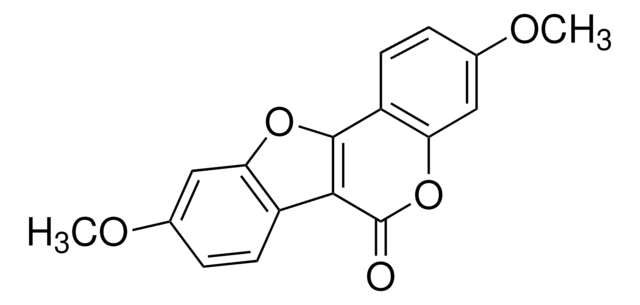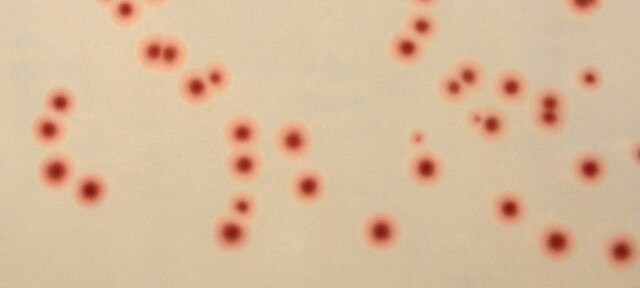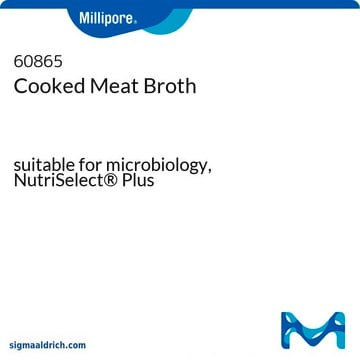B3051
Brucella broth base
suitable for microbiology, NutriSelect® Plus
Sign Into View Organizational & Contract Pricing
All Photos(1)
About This Item
UNSPSC Code:
41171607
NACRES:
NA.85
Recommended Products
sterility
non-sterile
Quality Level
form
powder
shelf life
limited shelf life, expiry date on the label
manufacturer/tradename
NutriSelect® Plus
technique(s)
microbiological culture: suitable
pH
7.0±0.2 (25 °C)
application(s)
clinical testing
environmental
food and beverages
sample preparation
microbiology
suitability
selective for Brucella spp.
selective for Campylobacter spp.
Related Categories
Application
Recommended for enrichment, isolation and cultivation of Brucella species.
Components
Components (g/L):
Casein Enzymic Hydrolysate 10.00
Peptic Digest of Animal Tissue 10.00
Yeast Extract 2.00
Dextrose 1.00
Sodium Chloride 5.00
Sodium bisulphite 0.10
Casein Enzymic Hydrolysate 10.00
Peptic Digest of Animal Tissue 10.00
Yeast Extract 2.00
Dextrose 1.00
Sodium Chloride 5.00
Sodium bisulphite 0.10
Preparation Note
Suspend 14.05 g of Brucella Broth Base in 500 ml of distilled water. Heat to boiling to dissolve the medium completely. Sterilize by autoclaving at 15 lbs. pressure (121°C) for 15 minutes. Cool to 45-50°C and aseptically add sterile 5% v/v heat inactivated (H1138) horse serum. Add polymyxin B (2,500 IU, Cat. No. 81334), bacitracin (12,500 IU, Cat. No. 11702), nystatin (50,000 IU, Cat. No. 74721), cycloheximide (50mg, Cat. No. 01810), nalidixic acid (2.5mg, Cat. No. 70162) and vancomycin (10mg, Cat. No. 94747) to make the medium selective. Mix well before pouring into sterile petri plates or tubes.
For isolation of the Campylobacter species add the rehydrated contents of one vial of Campylobacter Growth Supplement (Cat. No. C2847) and 5-7% defibrinated sheep blood to 500 ml of medium base. 500 ml of medium base. The Campylobacter Growth Supplement can also be made by mixing 125 mg sodium pyruvate (Cat. No. 15990), 125 mg sodium metabisulfite (Cat. No. 71928 )and 125 mg ferrous sulfate (Cat. No. 44970) in 2 ml of distilled water and filtering the solution through a sterile 0.4 mm filter to sterilize.
For isolation of the Campylobacter species add the rehydrated contents of one vial of Campylobacter Growth Supplement (Cat. No. C2847) and 5-7% defibrinated sheep blood to 500 ml of medium base. 500 ml of medium base. The Campylobacter Growth Supplement can also be made by mixing 125 mg sodium pyruvate (Cat. No. 15990), 125 mg sodium metabisulfite (Cat. No. 71928 )and 125 mg ferrous sulfate (Cat. No. 44970) in 2 ml of distilled water and filtering the solution through a sterile 0.4 mm filter to sterilize.
Footnote
We offer two media types: the superior granulated GranuCult® and the cost-efficient powdered NutriSelect® culture media, depending on your needs.
The designations basic, plus, or prime are added to indicate the quality control level, from basic quality control to standard QC plus to prime for full regulatory compliance.
The designations basic, plus, or prime are added to indicate the quality control level, from basic quality control to standard QC plus to prime for full regulatory compliance.
Legal Information
GRANUCULT is a registered trademark of Merck KGaA, Darmstadt, Germany
NutriSelect is a registered trademark of Merck KGaA, Darmstadt, Germany
related product
Product No.
Description
Pricing
Storage Class Code
11 - Combustible Solids
WGK
WGK 3
Personal Protective Equipment
dust mask type N95 (US), Eyeshields, Gloves
Choose from one of the most recent versions:
Already Own This Product?
Find documentation for the products that you have recently purchased in the Document Library.
Customers Also Viewed
Mohsen Tabasi et al.
Comparative immunology, microbiology and infectious diseases, 63, 87-93 (2019-04-10)
Brucellosis is the most common zoonotic diseases worldwide. The aim of this study was to develop and evaluate the diagnostic performance of an indirect-ELISA (I-ELISA) method based on whole cell Brucella abortus S99 lysates for detection of IgM anti-Brucella antibodies
Carla Palacios-Gorba et al.
Food & function, 11(5), 4525-4534 (2020-05-13)
Currently, Helicobacter pylori is the unique biological carcinogenic agent. The search for antimicrobial alternatives to antibiotics against this pathogen has been categorized as a priority due to the drastic failure associated with current applied antibiotic therapy. The present study assessed
A selective medium for the isolation of brucellae from contaminated materials.
C D KUZDAS et al.
Journal of bacteriology, 66(4), 502-504 (1953-10-01)
A preliminary report on a selective medium for the culture of Brucella, including fastidious types.
L M JONES et al.
Bulletin of the World Health Organization, 19(1), 200-203 (1958-01-01)
M Boyle et al.
Applied and environmental microbiology, 74(10), 2997-3001 (2008-03-25)
Batch solar disinfection (SODIS) inactivation kinetics are reported for suspensions in water of Campylobacter jejuni, Yersinia enterocolitica, enteropathogenic Escherichia coli, Staphylococcus epidermidis, and endospores of Bacillus subtilis, exposed to strong natural sunlight in Spain and Bolivia. The exposure time required
Our team of scientists has experience in all areas of research including Life Science, Material Science, Chemical Synthesis, Chromatography, Analytical and many others.
Contact Technical Service










